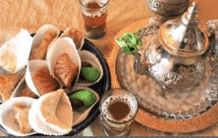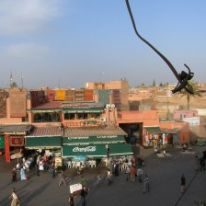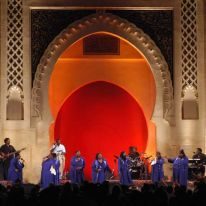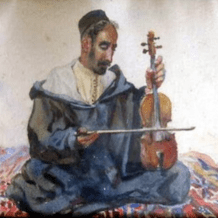
The Master Musicians of Jajouka is a group led by Bachir Attar, from the village of Jajouka near Ksar-el-Kebir in the southern Rif Mountains Northern Morocco. The inhabitants of this small village are from the Ahl Sherif (“the saintly”) tribe. The Attar clan of Jajouka is the founding family of Jajouka and keepers of one of the world’s oldest and most unique surviving musical traditions. The music and secrets of Jajouka have been passed down through generations from father to son, by some accounts for as long as 1,300 years. The musicians of Jajouka are taught from early childhood a complex music which is unique to Jajouka, until they finally become malims or masters. They possess baraka, (good luck) or the blessing of Allah, which gives them the power to heal, and the endurance required to play some of the most intense and complex music around. The Master Musicians of Jajouka are all descendants of one family, the Attars. Attar is a Sufi watchword and a deeply mystical name meaning “perfume maker”.

The instruments played by the Master Musicians of Jajouka are a flute called the lira, a double-reed instrument called the rhaita; it is similar to an oboe, but has a louder, more penetrating tone, a drum called the tebel made of goat-skin and played with two wooden sticks and a drum called the tarija.
The music itself is considered to be part of the Sufi tradition of Islam. Prior to the colonization of Morocco by France and Spain, master musicians of the village were said to be the royal musicians of the sultans. In past centuries master musicians of the Jajouka village traditionally were excused by the country’s rulers from manual labor, goat-herding, and farming to concentrate on their music because the music’s powerful trance rhythms and droning woodwinds were traditionally considered to have the power to heal the sick.






